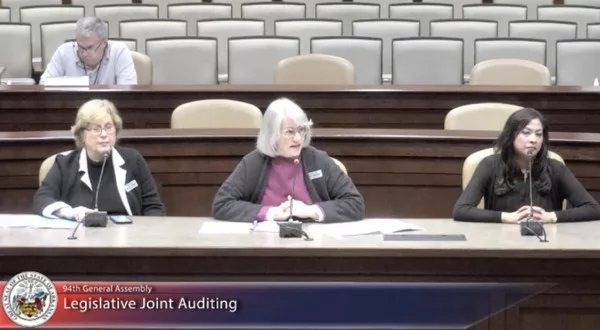
Fiscal 2022 audit of public TV raised questions of whether administrators deliberately sidestepped or broke state procurement law
Arkansas lawmakers asked the state’s nonpartisan auditing body on Thursday to examine more than two years of “procurements and related processes” at Arkansas PBS.
The request comes after the state’s regularly scheduled fiscal year 2022 audit into the publicly funded educational channel revealed what auditors considered questionable purchasing practices. At the heart of lawmakers’ and auditors’ concerns is that Arkansas PBS officials allegedly sidestepped state laws related to contract bidding.
Arkansas PBS, previously known as Arkansas Educational Television Network (AETN), has been under legislative scrutiny for months. The audit for the year ended June 30, 2022, has been a subject of Legislative Joint Auditing Committee meetings since August.
Agency administrators again faced questions from lawmakers at Thursday’s audit committee meeting. Legislators also heard accusations of misconduct by public TV executives from former Arkansas PBS employees.
The committee approved a request for a special audit to investigate Arkansas PBS’ purchases, decisions and procedures from July 1, 2021, to the present. The committee also deferred approval of the 2022 audit.
Auditors who worked on the 2022 audit “noticed numerous purchases right at that $20,000 threshold,” the amount that would trigger a bidding process, Tom Bullington, deputy auditor for state agencies, said.
This gave the impression that Arkansas PBS “was intentionally trying to toe that line,” Bullington said in response to questions from Sen. Linda Chesterfield, D-Little Rock.
The audit also found that Arkansas PBS entered contracts with two companies owned by the same person. Bullington mentioned that the owner of one of the companies formed the second company eight days before Arkansas PBS entered a contract with the second. The two companies’ services were similar enough that the agency appeared to be attempting to avoid a bidding process, he said.
Contracting with one company would have required bids because the total would have been above $20,000, while contracting with two companies circumvented this requirement, according to the auditors.
No intention to circumvent
Sen. Missy Irvin, R-Mountain View, asked Arkansas PBS Executive Director Courtney Pledger who directed the owner to start a second company. Pledger said she did not believe anyone at the agency gave this instruction.
Upon further questioning from legislators, Pledger said she and other administrators did not violate or circumvent procurement law, nor did they intend to do so.
“We followed the advice and guidance of our former fiscal officer,” Pledger said. “Now that we are aware that it is perceived to be not good practice, not solid practice, we will not conduct business in that way in the future. We felt we were acting, and always aimed to act, within the law.”
Auditors could not “unequivocally” conclude that Arkansas PBS committed the offense of split purchasing, or the intentional division of a purchase into multiple purchases to avoid following procurement rules, Bullington said in response to lawmakers’ questions.
Pledger told lawmakers last month that Arkansas PBS is training its entire staff in state procurement law, the Arkansas Democrat-Gazette reported.
Karen Watkins, the agency’s chief financial officer since February, said she was surprised to learn upon starting the job that agency staff were regularly making purchases and entering contracts without training in procurement law. She said she reviewed the agency’s fiscal year 2022 purchase orders and “observed the same things” that auditors did.
“It is unfair to hold division directors responsible for knowing procurement rules when they have to know lots of other rules,” Watkins said. “They should have a resource within the agency to support them in that function, and that did not exist.”
In response, Irvin told Pledger it is the agency director’s responsibility to know purchasing rules and to make sure employees know and follow them.
For more on this story, visit the Arkansas Advocate.
WebReadyTM Powered by WireReady® NSI










